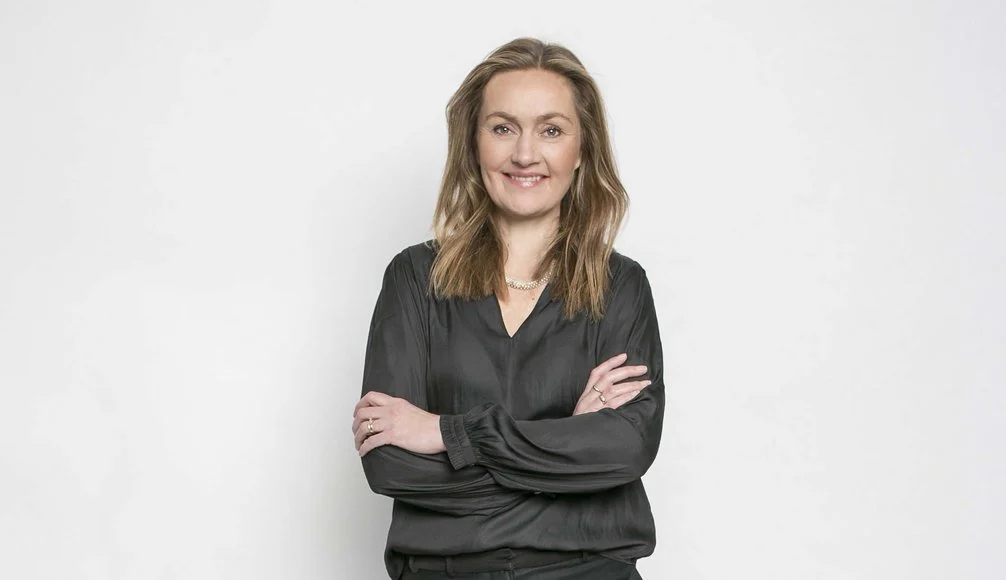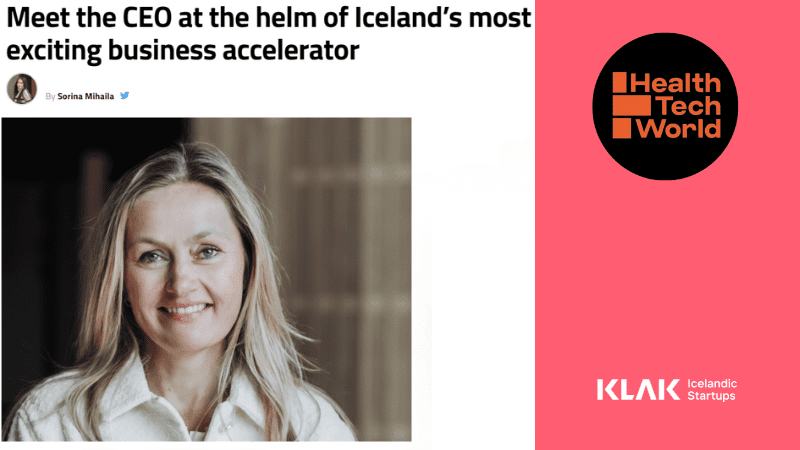
Famous for its stunning natural beauty, Iceland is home to hundreds of ambitious start-ups. Ranging from healthcare to renewable energy, the country’s business ventures have one mission: to pave the way for a better future.
At the heart of this is KLAK – Icelandic Startups, a non-profit organization helping savvy entrepreneurs turn their early-stage ideas into thriving businesses.
A leading force in the entrepreneurial community, KLAK is committed to equipping start-ups with the tools they need to grow domestically and internationally and connecting them with experts, investors and key players in the business world.
Health Tech World sat down with CEO, Ásta Sóllilja Guðmundsdóttir, to find out how.

Hi Ásta, could you tell us a bit about your background?
My career began in the biotech and pharmaceutical industries, grounded in my academic background in biology and immunology. Recognising the need to bridge science with business, I pursued a diploma in management from Harvard University in the US, followed by an MBA from Reykjavík University.
This blend of scientific knowledge and business insight steered me towards mentoring start-ups, launching my own ventures, and engaging in angel investing. A key milestone was contributing to the development of a company from its inception through venture capital funding and commercialisation as a chairman of the board.
Before my current role, I worked at a newly founded technology transfer office (TTO) in Iceland, combining my scientific expertise with business strategy to bring academic innovations to the market.
This journey through science, business and innovation has led me to my role as CEO of KLAK – Icelandic Startups, where I leverage my diverse experience to support emerging enterprises.
KLAK was founded almost 24 year ago. How has the organisation changed throughout the years and what are some of the ways in which it helps start-ups today?
KLAK – Icelandic Startups has evolved since its inception. It traces its roots to two distinct entities that both focused on nurturing innovation in Iceland.
Back in 2000, KLAK Innovation Center was established as a for-profit unit within the IT-company Nýherji (now Origo). Later, in 2007, Innovit was launched as a non-profit venture initiated by ambitious university students, and supported by prominent Icelandic institutions.
These two initiatives joined forces in 2012 to launch Iceland’s first business accelerator, Startup Reykjavik. The cooperation was a success and the two entities merged in 2013 to form what is now known as KLAK-Icelandic Startups.
Currently, we are operated as a non-profit owned by a consortium of businesses and institutions, including Origo, the University of Iceland, and the University of Reykjavik.
As KLAK has grown, interest in innovation in Iceland has surged. Our office now resides in the Gróska Innovation Hub, a dedicated space for our programmes. This is a departure from the past when our programmes were scattered, and our team was always on the move.
We’ve expanded our programmes to cater to different start-up needs and stages servicing between 70-80 start-ups a year.
A recent addition is the Dafna programme, a successful collaboration with the Technology Development Fund. It provides grant recipients with eight workshops at KLAK over a period of four months, coupled with mentorship from experienced entrepreneurs and specialists. This approach not only offers financial support but also imparts crucial entrepreneurship education and mentoring.
Our collaboration with start-up support systems in the Nordics and abroad has strengthened, creating a more interconnected network.
KLAK helps start-ups grow by accelerating their development and connecting them with key players in the business world
We’ve enhanced our mentorship system in collaboration with the MIT Venture Mentoring Service, to provide further support to startups.
Since its inception in 2008, the Golden Egg competition has grown and evolved, and is today the largest start-up idea competition in the country. The competition, once exclusive to university students, is now open to everyone with entrepreneurial aspirations, showcasing our commitment to democratising opportunities in the entrepreneurial landscape.
A big part of your work at KLAK involves promoting entrepreneurship in universities. How excited are students in Iceland about starting their own businesses?
The enthusiasm for entrepreneurship is constantly on the rise. Nowadays, students are surrounded by strong role models in the entrepreneurial field.
We’re living in an era where many of the world’s most influential figures are self-made tech entrepreneurs, individuals who started with nothing but an idea. And this trend isn’t just happening internationally; we’ve witnessed a number of Icelandic entrepreneurs who have taken their innovative ideas and scaled them into successful international ventures.
These local success stories resonate with our students. A growing number of them now express a strong desire to pursue the entrepreneurial path, inspired by these examples of turning possibilities into realities.
How do you support them to bring their ideas to life?
The innovators of tomorrow are the university students of today. Recognising this, KLAK, with its unique ties to two leading universities, places a significant emphasis on nurturing and inspiring students who are keen on pursuing innovation. Our commitment to this cause is reflected in our active involvement in educational outreach programmes.
We frequently visit various university classes, not just to talk about entrepreneurship but also to provide a comprehensive overview of the support programmes that KLAK offers. Our aim is to ignite a spark of entrepreneurial spirit among students and equip them with the necessary information to start turning their innovative ideas into reality.
Moreover, our team members have played a role in orchestrating a comprehensive three-week entrepreneurship workshop at the University of Reykjavik. This workshop is a mandatory part of the curriculum for all students at the university, bringing together students from diverse disciplines to tackle real-world challenges and devise viable business solutions.
Several concepts developed during these workshops have made their way to the Golden Egg idea competition, showcasing the practical impact of this initiative.
Beyond these educational programmes, we also offer consulting services to university students and aspiring entrepreneurs, guiding them through the complexities of the start-up landscape.
Our efforts extend to collaborating with the University of Iceland in organising a career fair, with a special focus on entrepreneurship and the various opportunities within the start-up ecosystem.
You work with hundreds of entrepreneurs, all with unique ideas and approaches. What is the most challenging part?
A key challenge that we encounter is helping aspiring entrepreneurs understand that successful companies are not the product of solitary genius, but rather the result of collaborative effort.
It’s essential for them to appreciate the importance of diverse specialisations and experiences. An entrepreneur’s role is not just to innovate but also to set a clear vision and inspire a varied team to work collectively towards a common goal. This approach, which emphasises the synergy of different talents, is crucial in creating sustainable and successful businesses.
Many of the start-ups you support are in the healthcare sector. How do you find helping these businesses?
Supporting start-ups in the healthcare sector is not only deeply rewarding but also vital, especially considering the robust health tech sector in Iceland.
The remarkable achievements of Icelandic start-ups in this field, such as Oculis’ Nasdaq listing, Kerecis’ US$1.2bn unicorn exit, and Sidekick Health’s strategic acquisition in Germany, highlight the significant impact of our healthcare innovators.
My personal connection to health tech, stemming from my background, makes this work especially meaningful. Our involvement with early-stage healthcare start-ups primarily happens through our Dafna programme.
Many of these start-ups are transitioning from research to business, often needing guidance in business development for sustainable growth. At KLAK, with our skilled mentors, we provide important support and structure.
Do you think healthcare start-ups could be somewhat more difficult to work with?
Healthcare start-ups indeed navigate a more complex landscape than start-ups in many other sectors. They are subject to rigorous regulatory requirements, with heightened concerns around data security and privacy.
The development process for medical devices or digital health solutions typically involves extended periods of testing, clinical trials and a lengthy regulatory approval process. This journey can be both financially and emotionally difficult.
These start-ups also often face substantial initial costs associated with research, development and adhering to compliance standards. This makes securing adequate funding and effective cash flow management particularly challenging.
However, these very complexities make working with healthcare startups a uniquely engaging and rewarding experience. The opportunity to make a significant impact on patient care and the healthcare system at large is a powerful motivator, driving our commitment to support these startups in overcoming obstacles and achieving their goals.
What is the most exciting part about working at KLAK?
The most gratifying part of my role at KLAK is seeing the success of start-ups that have gone through our accelerator programmes. There’s a unique sense of fulfilment in observing these companies evolve from ideas to entities that secure funding and acquire their first customers.
Adding to this satisfaction is the privilege of working with an incredible team at KLAK. It’s a team that not only excels professionally but also infuses joy and enthusiasm into their work.
This positive atmosphere creates an inspiring and enjoyable work environment, enhancing the overall fulfilment I derive from my role at KLAK. It’s this blend of witnessing entrepreneurial success stories unfold and collaborating with a team that is passionate and takes pleasure in what they do that makes my work here exceptionally rewarding.
Published by Health Tech World, February 12, 2024
By Sorina Mihaila
